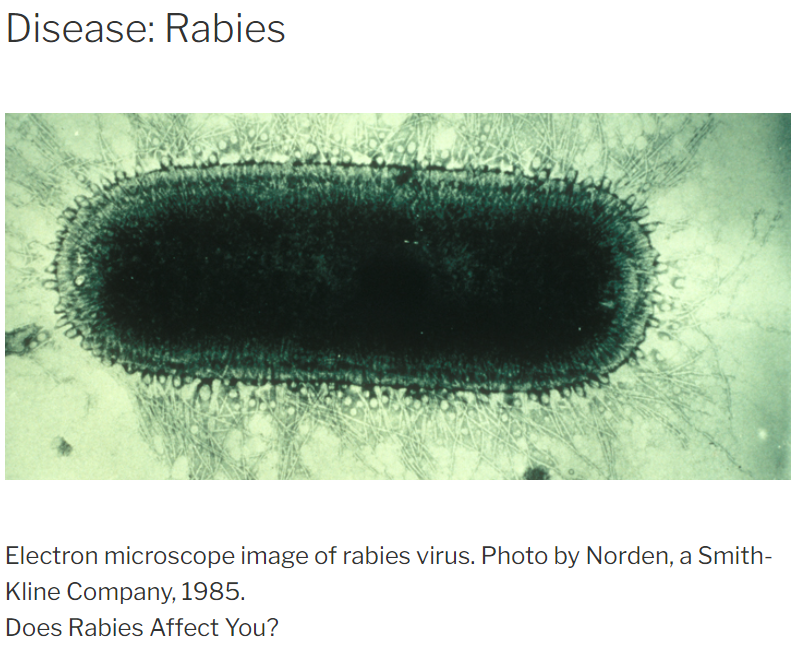STORY UPDATED: check for updates below.

Has rabies "never been proven to exist"? No, that's not true: Rabies is a viral disease that affects mammals, including humans, and is typically transmitted through the saliva of infected animals, often through bites. The existence of rabies is well-documented in medical and scientific literature, and extensive efforts worldwide are made to prevent and control its spread through vaccination and other measures.
The claim appeared in a post and video (archived here) published on Instagram on February 11, 2024, under the title "Illness - Root cause." The post's caption said:
The whole germs jumping all over never made much sense - But here are the root causes of illnesses. We were sold a 'virus' is jumping all over, but in reality we all faced a bait and switch by the rockefeller medical system. Free the mind from the fear of germs and elevate your knowledge.
.
Books on the topic:
The contagion myth
Dissolving Illusions
The invisible rainbow
.
1923 Lancaster study: https://en.rattibha.com/thread/1629159544348717061
.
.
#paleo #coffee #vegan #eyes #sustainability #superfoodsmoothie #organic #eyesight #smoothierecipes #holistichealth #plantbaseddiet #adaptogens #smoothie #mushrooms #healthylifestyle #coffeetime #arthritis #meditation #inflammation #supplements #brainhealth #backtonature #nature #eyes #cats #cultivateelevate #electroculture #gardening #copper
This is what the post looked like on Instagram at the time of writing:
(Source: Instagram screenshot taken on Mon Feb 12 15:38:30 2024 UTC)
The video
In this 87-second video, the narrator makes his case that out of a list of seven illnesses, "none of these viruses have been proven to exist." For this fact check, Lead Stories will only address the particular claim about rabies. Here's the full transcript of what the narrator said (emphasis of the rabies section is ours):
So, today we're gonna hit on the root cause of illnesses and this is really important. They always tell you viruses are jumping all over, which is a bunch of hodgepodge. But first and foremost, you have herpes, which is too much friction, which is lack of collagen, open wounds.
Next, you have the flu. Whenever you have the flu, they tell you what? Drink a lot of salt, have some soup, because you have a electrical salt imbalance.
Next, we move to the pandemic, 2020. Remember that whole thing? Radiation poisoning: loss of smell, loss of taste, loss of hair, nausea, symptoms of radio wave sickness. Then, somebody says I have extended CV 19 [COVID-19]. Same exact symptoms: you're holding that phone which has 5G or you have 5G in your home and there's new towers that have been placed all over. Same exact thing.
Next, we move to rabies. You know, the things they're putting into all the dogs when they inject into that. That one's actually never been proven to exist, but they poison the dogs anyways.
Next, we go into HIV, which the root cause was AZT. It was giving all the symptoms of HIV, so people were going and getting more AZT.
And then last but not least, we moved to polio. Polio was caused by DDT and then they sold people one of these again.
So when it comes to it, none of these viruses have been proven to exist. There's a great book called 'The Contagion Myth' by Dr. Tom Cowan. There's also 'Dissolving Illusions' and 'The End of COVID' with Alec Zeck.
History of rabies
Rabies, a member of the Rhabdoviridae family, is not a recent discovery. In their December 18, 2015, research article (archived here) titled "The Ancient Curse: Rabies," authors Jesse D. Blanton and Ryan M. Wallace highlighted that the virus has been identified for at least 2,500 years:
Rabies is one of the oldest recognized zoonotic diseases. The first recorded description of canine rabies was apparently made by Democritus around 500 B.C.E. Aristotle, writing of rabies in his Natural History of Animals, described dogs suffering from a madness causing irritability and noted that other animals became diseased after being bitten by these sick dogs.
In Chapter 1 of the 2013 book (archived here) titled "Rabies: Scientific Basis of the Disease and Its Management," author Alan C. Jackson added:
Rabies has a rich history that goes back to antiquity. The writings of [Girolamo] Fracastoro (1546) and [Giovanni Battista] Morgagni (1769) showed great early insights into rabies pathogenesis.
[Georg Gottfried] Zinke (1804) performed the first experimental studies on rabies transmission. [Pierre] Galtier used rabbits in his rabies experiments, which was soon also taken up by [Louis] Pasteur.
Pasteur developed a rabies vaccine and used a series of inoculations of infected spinal cords from rabbits with partial inactivation after periods of desiccation, and he successfully immunized the first patients in 1885.
Stanford University also compiled a lengthy timeline on rabies.
Centers for Disease Control and Prevention
In a February 13, 2024, email to Lead Stories, Nick Spinelli, a public affairs specialist with the Centers for Disease Control and Prevention (CDC), provided the public health agency's response. "Rabies is a fatal but preventable viral disease," it opened. The statement continued:
It can spread to people and pets (mammals) if they are bitten or scratched by a rabid animal. Animals that get rabies may have characteristic signs of illness like excessive drooling, aggression, trouble moving, or acting unafraid of people. CDC and other public health laboratories have sophisticated tests to confirm rabies in animals and people. Thousands of animals test positive for rabies every year in the US.
Rabies is also an ancient disease, with archaeological evidence suggesting there have been cases for thousands of years. The first effective rabies vaccine that was used to treat a human bite victim was administered by Louis Pasteur in 1885. Each year, rabies causes approximately 59,000 human deaths worldwide. Rabies can be prevented by vaccinating pets, staying away from wildlife, and seeking medical care after potential exposures before symptoms start.
Additionally, the U.S. Department of Agriculture's National Institute of Food and Agriculture website shows a detailed image of the virus:
(Source: USDA Food and Agriculture screenshot taken on Mon Feb 12 22:11:38 2024 UTC)
American Veterinary Medical Association
Michael San Filippo, media relations manager at the American Veterinary Medical Association (AVMA), echoed the CDC in confirming the virus is real. Responding on February 12, 2024, to an inquiry from Lead Stories, he wrote in an email:
Rabies exists, of course, and is a major public health concern worldwide, killing tens of thousands of people every year.
The AVMA has more info about rabies on its website; so does the World Health Organization.
Read more
Additional Lead Stories fact checks of claims related to viruses can be found here.
Updates:
-
2024-02-13T17:23:50Z 2024-02-13T17:23:50Z Adds context from Centers for Disease Control and Prevention.














